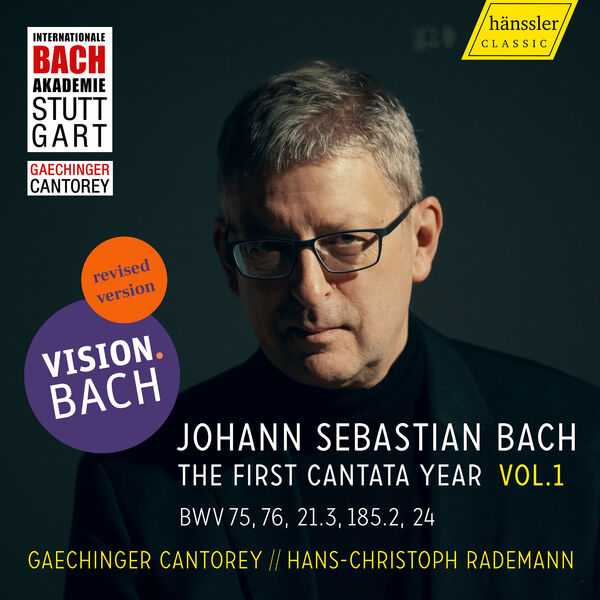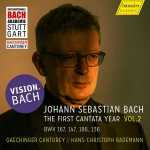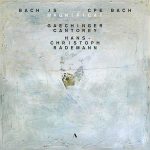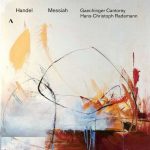

Composer: Johann Sebastian Bach
Performer: Gaechinger Cantorey, Hans-Christoph Rademann
Number of Discs: 2
Format: FLAC (tracks)
Label: Profil Medien
Catalogue: HC23026
Release: 2024
Size: 1.48 GB
Recovery: +3%
Scan: cover
CD 01
Die Elenden sollen essen, BWV 75, Pt. 1
01. No. 1, Die Elenden sollen essen, daß sie satt werden
02. No. 2, Was hilft des Purpurs Majestät
03. No. 3, Mein Jesus soll mein alles sein
04. No. 4, Gott stürzet und erhöhet
05. No. 5, Ich nehme mein Leiden
06. No. 6, Indes schenkt Gott ein gut Gewissen
07. No. 7, Was Gott tut, das ist wohlgetan
Die Elenden sollen essen, BWV 75, Pt. 2
08. No. 8, Sinfonia
09. No. 9, Nur eines kränkt
10. No. 10, Jesus macht mich geistlich reich
11. No. 11, Wer nur in Jesu bleibt
12. No. 12, Mein Herze glaubt und liebt
13. No. 13, O Armut, der kein Reichtum gleicht!
14. No. 14, Was Gott tut, das ist wohlgetan
Die Himmel erzählen die Ehre Gottes, BWV 76, Pt. 1
15. No. 1, Die Himmel erzählen die Ehre Gottes
16. No. 2, So läßt sich Gott nicht unbezueget!
17. No. 3, Hört, ihr Völker, Gottes Stimme
18. No. 4, Wer aber hört
19. No. 5, Fahr hin, abgöttische Zunft!
20. No. 6, Du hast uns, Herr, von allen Straßen
21. No. 7, Es woll uns Gott genädig sein
Die Himmel erzählen die Ehre Gottes, BWV 76, Pt. 2
22. No. 8, Sinfonia
23. No. 9, Gott segne noch die treue Schar
24. No. 10, Hasse nur, hasse mich recht
25. No. 11, Ich fühle schon im Geist
26. No. 12, Liebt, ihr Christen, in der Tat!
27. No. 13, So soll die Christenheit
28. No. 14, Es danke, Gott, und lobe dich
CD 02
Ich hatte viel Bekümmernis, BWV 21, Pt. 1
01. No. 1, Sinfonia
02. No. 2, Ich hatte viel Bekümmernis in meinem Herzen
03. No. 3, Seufzer, Tränen, Kummer, Not
04. No. 4, Wie hast du dich, mein Gott
05. No. 5, Bäche von gesalznen Zähren
06. No. 6, Was betrübst du dich, meine Seele
Ich hatte viel Bekümmernis, BWV 21, Pt. 2
07. No. 7, Ach Jesu, meine Ruh
08. No. 8, Komm, mein Jesu, und erquicke; Ja, ich komme und erquicke
09. No. 9, Sei nun wieder zufrieden, meine Seele
10. No. 10, Erfreue dich, Seele, erfreue dich, Herze
11. No. 11, Das Lamm, das erwürget ist
Barmherziges Herze der ewigen Liebe, BWV 185
12. No. 1, Barmherziges Herze der ewigen Liebe
13. No. 2, Ihr Herzen, die ihr euch in Stein und Fels verkehret
14. No. 3, Sei bemüht in dieser Zeit
15. No. 4, Die Eigenliebe schmeichelt sich
16. No. 5, Das ist der Christen Kunst
17. No. 6, Ich ruf zu dir, Herr Jesus Christ
Ein ungefärbt Gemüte, BWV 24
18. No. 1, Ein ungefärbt Gemüte
19. No. 2, Die Reiclighkeit ist eine den Gottesgaben
20. No. 3, Alles nun, das ihr wollet
21. No. 4, Die Heughelei ist ein Brut, die Belial gehecket
22. No. 5, Treu und Wahrheit sei der Grund
23. No. 6, O Gott, du frommer Gott
Johann Sebastian Bach arrived in Leipzig on May 22, 1723. After peaceful years in the small residence town of Cöthen he was moving to the busy mercantile and university city, forsaking the office of Capellmeister at the princely court for the post of Cantor, as he was to call it. Just eight days later, on May 30, Bach presented his first cantata. On every Sunday and feast day outside the periods of Advent and Lent preceding Christmas and Easter respectively, it was the task of the Thomaskantor to direct such pieces in the churches of St. Nicolai and St. Thomas in turn. He had at his disposal the more musical of the 55 boys at St Thomas’s school and eight instrumentalists paid by the City. Talented students filled the gaps in the ensemble. They came from far and wide to improve their knowledge and play their part in Leipzig’s great musical tradition. The Internationale Bachakademie Stuttgart is performing all these cantatas in chronological order exactly 300 years later. The 23 concerts in all are taking place in and around Stuttgart; the refined live recordings are being released in this CD series on the Hänssler Classic label. The performances follow the latest state of Bach research documented in the new 2022 catalogue of Bach’s works BWV3. The ensemble of the Bachakademie, the Gaechinger Cantorey, plays under the direction of Hans-Christoph Rademann. For this purpose it comprises the instrumentalists and up to four vocalists per voice, including the soloists (details on the performers via QRCode), all specialists in their field, as Bach himself wished it. This is a vision that only now can be fulfilled in its ideal form. To this day the music will inspire its audience to devotion, challenge them to reflect and make them glad. It addresses questions of faith and comes to terms with particular situations of human life.



